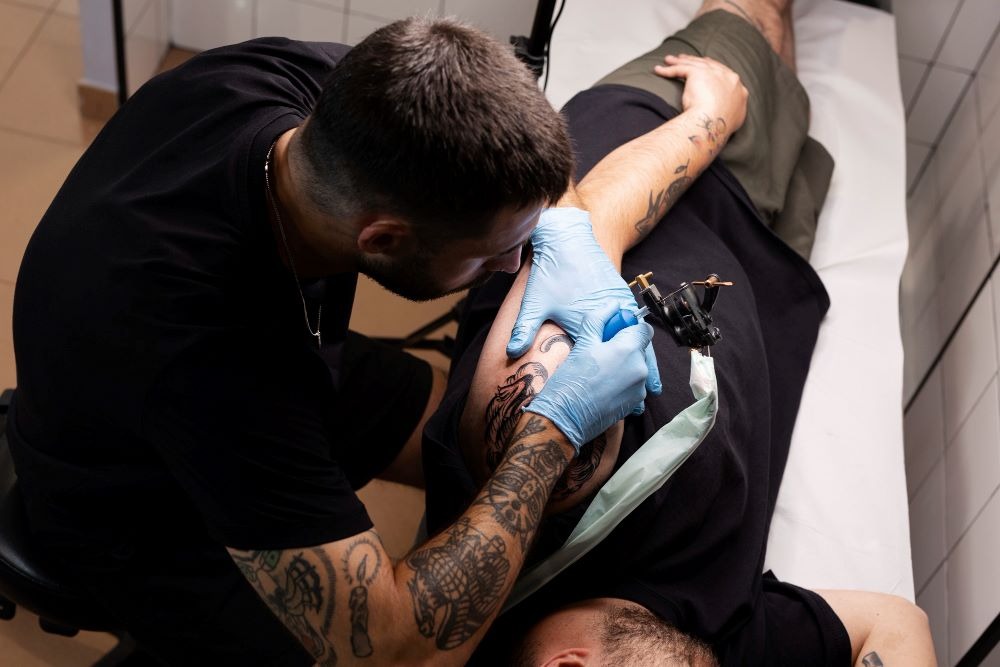Why Do People Get Tattoos?
Why Do People Get Tattoos? There's room for everyone in today's tattoo culture. The most important thing is that people feel free to make choices about their own bodies based on what makes them happy.
EVERYDAY LIFE
K.N.
8/24/20255 min read


Introduction to Tattoo Culture
Tattoos have become a prominent form of self-expression in contemporary society. People get tattoos for various reasons, ranging from cultural significance to personal milestones. But what drives someone to permanently mark their skin? Let’s explore the fascinating psychology behind the decision to get inked.
1. Self-Expression and Identity
One of the most common reasons people choose to get tattoos is for self-expression. Tattoos can symbolize one’s personality, beliefs, or interests. For many, a tattoo is a tangible representation of who they are. Whether it’s a favorite quote, an important date, or a tribute to a loved one, these designs enable individuals to tell their stories in a unique way.
Moreover, tattoos can be a form of identity exploration. Especially among youth, getting a tattoo can signify a rite of passage, a transition into adulthood where they embrace their individuality. It’s a canvas that allows them to showcase different facets of their evolving identity.
Tattoos can represent personal beliefs, values, or experiences.
They can symbolize important life events (e.g., overcoming struggles, honoring a loved one).
Some people use tattoos to express their individuality or creativity.
2. Emotional Healing and Empowerment
Tattoos often serve deeper emotional purposes as well. Many individuals get inked as a means of coping with significant life events. For example, a tattoo can commemorate a loved one who has passed away, creating a lasting tribute that aids in the healing process. This emotional connection gives the tattoo a profound significance, making it a part of one's journey toward acceptance and healing.
Furthermore, tattoos can empower individuals. For those who have overcome trauma or hardship, a tattoo can represent resilience and strength. The act of choosing to alter one’s body can be a reclamation of personal power, reinforcing control over one’s narrative. Thus, every tattoo becomes a badge of courage, reminding the wearer of their journey.
Some get tattoos to reclaim their bodies after trauma or illness (e.g., mastectomy tattoos).
Others use them as motivational reminders (quotes, symbols of strength).
3. Cultural and Social Influences
Culture plays a significant role in the decision to get tattoos. In some societies, tattoos are considered rites of passage or symbols of status. As tattoo acceptance has grown globally, so has the frequency of people getting inked. Peer influence can also contribute. Friends, family, or celebrities with tattoos might encourage an individual to explore this form of art.
The internet and social media have further fueled tattoo culture, showcasing various styles and encouraging people to share their designs. What was once a niche community is now celebrated worldwide, removing some of the stigma associated with body art.
In some cultures, tattoos have traditional meanings (e.g., Māori ta moko, Japanese irezumi).
Religious symbols (crosses, mandalas, etc.) can represent faith or spiritual journeys.
4. Art & Aesthetics
Tattoos, a blend of art, personal style, and culture, have evolved over time, ranging from tribal patterns to modern abstract designs. Artists use painting and graphic design techniques, arranging colors and elements to create unique designs. Each tattoo can share a personal story or reflect what someone believes in. As art shows focus on tattoos, they are increasingly seen as art, resembling paintings or sculptures.
Many people appreciate tattoos as a form of body art and decoration.
They may choose designs they find visually appealing or meaningful.
5. Memorial & Tribute
Memorial and tribute tattoos are deeply personal, permanent reminders of significant life events or people. They serve as a constant connection to what matters most, such as honoring a loved one or a beloved pet.
What makes memorial tattoos special is how personal they are. Sure, you might see some common elements like dates, names, or religious symbols, but each one tells a completely unique story. Some people go for subtle designs – maybe just initials hidden behind their ear or a small symbol on their wrist. Others choose bold, elaborate pieces that cover entire sections of their body.
People often get tattoos to honor lost loved ones (names, portraits, dates).
They can serve as permanent reminders of meaningful relationships or experiences.
6. Fashion & Trends
Tattoos aren't just ink on skin anymore – they're full-blown fashion statements that rival any designer accessory. Whether you're scrolling through Instagram or walking down the street, you've probably noticed how tattoo culture has completely transformed from something rebellious and underground to mainstream art that people wear with pride.
Tattoos have evolved from being associated with sailors and bikers to a diverse range of designs, from minimalist to bold. They've become as personal as your wardrobe, allowing people to express themselves, showcase interests, and stay updated with the latest trends.
Tattoos can be a way to follow trends or fit into certain subcultures.
Some people get matching tattoos with friends or partners as a bond.
7. Rebellion or Nonconformity
Let's be honest – tattoos have always been the ultimate middle finger to societal expectations. Whether you're sporting a small rebellious symbol behind your ear or have sleeves that tell the world you march to your own beat, rebellion and nonconformity tattoos are more than just body art. They're declarations of independence, written in ink on the canvas of your skin.
Rebellion tattoos aren't just about shocking people (though that can be a fun bonus). They're about claiming ownership of your body and your story in a world that's constantly trying to box you in. For decades, people have used ink to express their refusal to be ordinary, a tradition that continues to thrive today.
Historically, tattoos were associated with rebellion (e.g., sailors, bikers, punk culture).
Some people get tattoos to challenge societal norms or expectations.
8. Career & Commitment
Remember when getting a tattoo meant potentially kissing your corporate dreams goodbye? Yeah, those days are pretty much ancient history. Today's workplace is seeing a fascinating trend: people aren't just getting tattoos despite their careers – they're getting them because of their careers.
The professional world has transformed body art, displaying tattoos that celebrate professional commitment and career milestones. Nurses, teachers, and tech workers now wear designs like stethoscopes, quotes about education, or minimalist code snippets, not as rebellious statements.
Career and commitment tattoos aren't going anywhere. As workplace culture continues to evolve and personal expression becomes more valued, we're likely to see even more creative ways people choose to permanently celebrate their professional lives.
Certain professions (e.g., military, gangs) use tattoos to show allegiance or achievements.
Others get ink related to their passions or careers (e.g., music, art, sports).
9. Healing & Transformation
There's something pretty amazing about getting a tattoo that represents your personal journey of healing and growth. These aren't just your typical flash art pieces – we're talking about deeply meaningful ink that tells the story of where you've been and where you're headed.
Healing and transformation tattoos are basically visual reminders of your strength, resilience, and personal evolution. Maybe you've overcome addiction, survived trauma, battled mental health challenges, or simply grown into a better version of yourself. These tattoos capture that journey in permanent art.
Your transformation tattoo might be a phoenix rising from ashes, or it could be something as simple as a semicolon that represents your decision to keep going when you could have ended your story.
Tattoos can mark personal growth, recovery, or new beginnings.
Cover-up tattoos can help people move past regrets or bad experiences.
10. Just Because They Like It!
Remember when getting a tattoo meant you had to have some deep, meaningful story behind it? Those days are pretty much over. These days, more and more people are getting inked for the simplest reason of all: they just really, really like how it looks.
Now we're seeing a whole new wave of tattoo enthusiasts who are refreshingly honest about their motivations. They see a cool design on Pinterest, fall in love with a particular artist's style, or just think a certain image would look awesome on their arm.
Not every tattoo has a deep meaning—some people just enjoy the look or the experience.
Conclusion
The desire to get a tattoo is rooted in a blend of factors, including self-expression, emotional healing, and cultural influences. Tattoos serve as markers of identity, resilience, and social connections. As society continues to evolve, so does the art of tattooing, making it an enduring form of personal expression that reflects the complexities of human experience.
Thanks for reading
Subscribe, read new articles and support our work along the way.
Similar Posts
Life Is Tough Make It Chillable!
LITMICH © 2025. All rights reserved.


Please follow us & like us:
Contact Us
